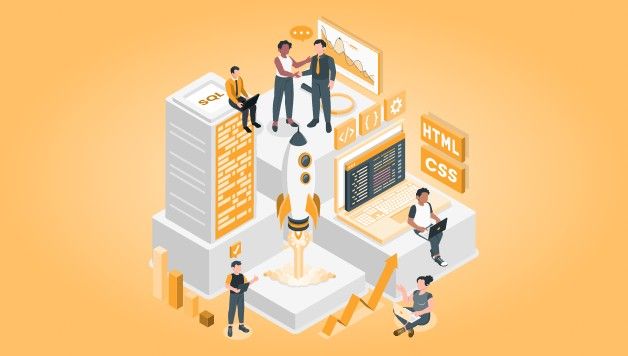


Discover how Full Stack Web Frameworks power AI-driven app development in 2025. Learn top frameworks, trends, and benefits.
Artificial Intelligence (AI) is no longer just a futuristic concept — it is now at the core of digital transformation. From predictive analytics to natural language processing, AI-powered applications are reshaping industries in 2025. At the foundation of these innovations lie Full Stack Web Frameworks, which provide the structure, scalability, and performance required to build intelligent solutions.
For developers and businesses alike, mastering the right full stack framework ensures faster development, stronger integration, and future-ready digital products.
AI-driven apps often combine front-end interactivity with back-end processing, making frameworks essential for smooth communication between layers.
AI workloads, such as handling large datasets or training models, demand scalable frameworks capable of managing growth efficiently.
With pre-built components, automation tools, and AI-compatible libraries, these frameworks accelerate the development cycle.
React offers a dynamic UI, while Node.js provides a non-blocking backend. This combination is widely used for AI dashboards, chatbots, and real-time analytics tools.
Angular is excellent for building structured frontends. When integrated with TensorFlow.js, it enables developers to create browser-based AI applications with powerful machine learning capabilities.
Vue’s simplicity and Laravel’s backend power make this one of the most flexible Full Stack Web Frameworks. It is especially useful for AI-powered eCommerce and recommendation systems.
Django’s Python foundation makes it a natural fit for AI, given Python’s dominance in machine learning. Combined with React, it provides scalable solutions for data-driven applications.
Still relevant in 2025, Rails helps developers quickly prototype AI-integrated solutions. Its convention-over-configuration approach saves time on repetitive coding.
Lightweight yet powerful, Express pairs seamlessly with Vue to deliver real-time AI insights. It is often used in IoT dashboards and lightweight AI assistants.
Next.js enables server-side rendering, crucial for SEO in AI-driven apps like intelligent content platforms. With Node.js, it ensures fast, reliable performance.
For enterprises, ASP.NET Core with Blazor allows full-stack C# development while integrating AI APIs from Microsoft Azure Cognitive Services.
Flask’s micro-framework structure gives developers control over AI model deployment, while React handles user experience. This pairing is ideal for startups experimenting with AI features.
Meteor simplifies full-stack development with real-time updates, making it highly effective for AI apps that require live data visualization.
Frameworks allow developers to use consistent tools across the frontend and backend, improving productivity.
Modern frameworks integrate easily with AI libraries like TensorFlow, PyTorch, and OpenAI APIs, allowing developers to innovate without reinventing the wheel.
With frameworks enabling faster data rendering, AI-powered apps can provide real-time personalization and seamless interaction.
Not every business has in-house expertise to maximize these frameworks. Many organizations partner with experts offering fullstack development services to ensure secure, scalable, and AI-ready application delivery.
By 2025, frameworks will evolve to include even more AI-native features, such as built-in machine learning components and seamless integration with large language models. Developers who master at least one modern full stack framework will continue to remain in high demand.
In 2025, application design begins with AI in mind. Developers need to consider how AI models interact with both the frontend and backend from the very start. This means structuring data pipelines, planning for machine learning integration, and ensuring applications can evolve as AI capabilities improve.
Low-code platforms integrated with modern frameworks are empowering developers to speed up prototyping. While traditional coding skills remain essential, leveraging drag-and-drop AI components shortens the learning curve and accelerates delivery.
AI apps often process sensitive data, from financial transactions to personal health records. Developers must adopt best practices such as encryption, role-based access control, and compliance with global standards like GDPR and HIPAA. Full stack development today is not just about performance—it’s equally about trust and transparency.
Generative AI Integration: From dynamic content generation to AI-powered UI design, frameworks are increasingly embedding tools that connect with LLMs.
Edge AI: Frameworks are now optimized to run models closer to the user, reducing latency and enhancing privacy.
Voice and Vision AI: The next wave of apps will integrate natural voice commands and computer vision directly into web solutions. Frameworks that adapt quickly will dominate.
Serverless AI Backends: Cloud-native full stack solutions are reducing infrastructure overhead while scaling AI deployments globally.
The evolution of web development in 2025 is not just about coding efficiency—it’s about creating intelligent systems that learn, adapt, and deliver personalized experiences. The businesses are demanding smarter solutions, and developers are responding with frameworks that seamlessly merge AI with full stack practices.
By adopting forward-looking strategies, collaborating with AI tools, and mastering modern frameworks, developers can future-proof their careers while helping organizations innovate at scale. The synergy between web frameworks and AI will define the next decade of digital transformation, making now the best time to invest in these technologies for 2025.
AI-powered applications are no longer optional; they are essential for businesses aiming to stay competitive in the digital-first world. Leveraging the right Full Stack Web Frameworks allows developers to integrate AI seamlessly while ensuring performance, security, and scalability.
Whether you’re building real-time analytics tools, AI-powered chatbots, or intelligent enterprise applications, these frameworks provide the foundation you need. For businesses, partnering with experts can accelerate success, while for developers, learning these frameworks ensures a future-proof career.
